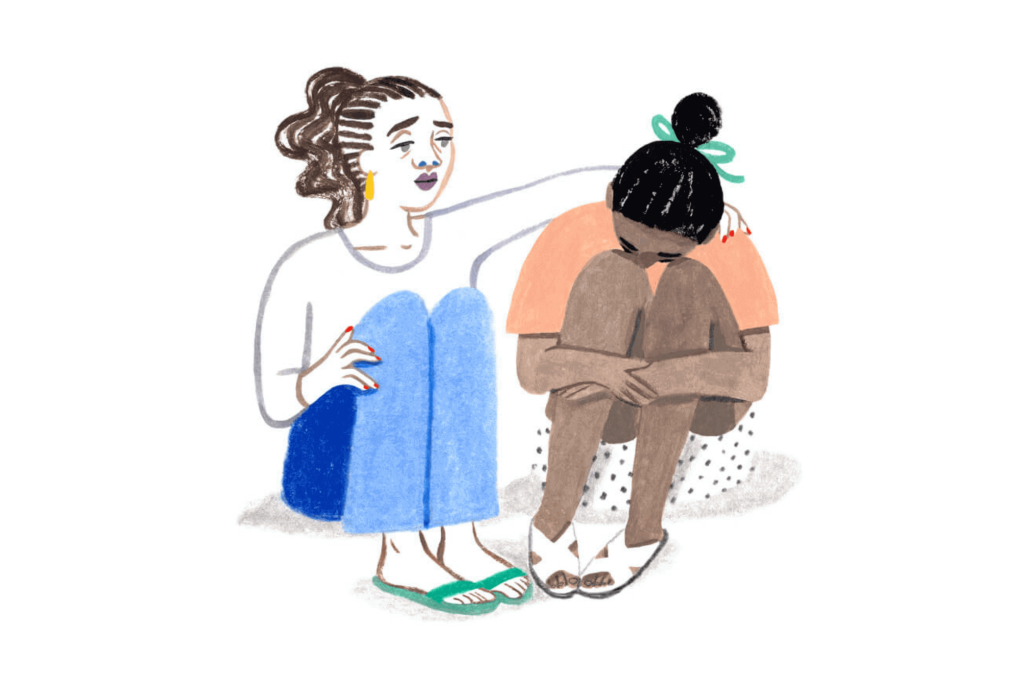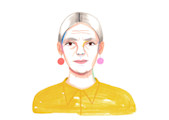Breaking up with a partner is one of the most traumatic life experiences, right up there with losing a loved one. Following the initial shock of a breakup, you may feel like you've been hit by a bus. You went from having a +1, a best friend, a Netflix partner, to suddenly feeling very alone.
A more scientific examination of breakups—why and how they occur, what triggers the feelings that follow a breakup, and the psychology of missing your ex—may provide a chance for self-analysis.
Will this new scientific understanding instantly make you feel better? Probably not. But being able to recognize some of the common components of heartbreak may help you to know you are not alone in your suffering.
Why are breakups so painful?
Emotionally, many of us can understand what makes a breakup painful. You’re losing someone—and a relationship with that person.
If you were in a long-term relationship, you might have even envisioned your future with your ex, so you’re losing that idealized future, too.
Or maybe they were the main person you used to confide vulnerable things in. If you lived with your partner, you might suddenly feel intense loneliness, being the only person in the house. In any case, breakups can disrupt everything from your future expectations to your daily routine.
In fact, a study in the Journal of Neurophysiology found that breaking up can feel comparable to addiction withdrawals. Dopamine, the chemical responsible for motivation and drive, decreases when a relationship is over. So, like an addict who is focused on their high, you may seek dopamine from other sources or start obsessing over your ex.
It's safe to assume that it may take three to six months to recover from a breakup.
In another study, researchers gave subjects pictures of their exes and took scans of their brains. The results showed that the part of our brain responsible for physical pain lit up when they saw the images. There’s a reason they say your heart is breaking.
The aftermath of a breakup
The way you feel after a breakup really depends on the details of the breakup.
Obviously breakups hurt more if your ex left you for someone else. Knowing that your ex is with someone new makes it even harder to move on. If your ex left you, it also means they had more time to prepare for the breakup, since they initiated it. So while they saw it coming, you were completely blindsided.
Before her untimely death in 2020, author Elizabeth Wurtzel wrote about feeling blindsided when her marriage fell apart:
"I did not see that the game was over. I did not know the clock was running. I never lose, but I do run out of time. It turns out this was basketball and not baseball. While I looked away, my marriage fell apart."
There are several other conditions that make breakups even more painful, including:
it was your first serious relationship,
your ex was your only close friend,
your ex dated someone new right away, or
you believe that your ex is the only one for you.

There is light at the end of the tunnel, though.
In her book Tiny Beautiful Things, author Cheryl Strayed writes: "Accept that someday what pains you now will surely pain you less."
How long does it take to get over a breakup?
There is not a set timeline for how long it takes to get over a breakup. In most cases, how long you were in the relationship determines how long it takes to get over someone.
However, research can provide a likely timeline. For example:
A study analyzed 155 undergraduate students that had recently gone through a breakup. After three months, most students felt they had moved on from the breakup.
Another study analyzed the behavior of users on Reddit.com who had recently experienced a painful breakup. They found that most people returned to a stable emotional state within six months of the breakup.
Based on these studies, it's safe to assume that it may take three to six months to recover from a breakup.
Tips on how to move on
Heartbreak is rough, and the best recovery is likely just time. But science tells us that there are things we can do to help the process along.

Pursue your passions
When you're in a relationship, you may confuse your partner's interests with your own. If you dated a sports fanatic, it's not uncommon to become one too. When the relationships ends, you may realize you never really enjoyed spending an entire Sunday watching football.
Following a breakup is a good time to find some new interests or rediscover interests you had before. This may sound simple and obvious, but finding a new passion isn't always easy. Joining a new social club, volunteering for a cause you care about, even joining the office fantasy football league will help you move on faster.
Try self-affirmations
Some people find that positive self-affirmations can help after a breakup. Some examples of these phrases include:
I was fine before them, and I’ll be fine after them.
I forgive myself.
There will be something better.
I am getting better every day.
I am enough.
Self-affirmations aren't always helpful, though. One study found that reciting positive self-affirmations made people with low self-esteem actually feel worse.
If that's the case, consider trying introspective self-talk instead. This method encourages asking why you're feeling the way you do, which encourages you to view things in a more cooperative, problem-solving way.
For example, ask yourself: "Why do I continue to look for happiness in the same place I lost it?"
Identify your attachment style: Free online quiz
Your attachment style dictates how you behave in relationships. Understanding how your attachment style influences your romantic relationships can help you make sense of your own behavior.
To find out what your attachment style is, take this Attachment Style quiz to get a customized report.
There is hope for recovery after a painful breakup. It may take time, but with these tips, you can eventually feel happy and healed again.
Reconnect with friends
Being with people you care for and who care for you is an invaluable salve. Laughing and talking out your feelings with your friends is not only enjoyable, but it can also reconnect you with yourself, and remind you you’re not alone.
Unfortunately, it's more difficult to connect with friends during the COVID-19 pandemic. However, having a support system is vital to get over a breakup. By having people to process emotions and laugh with, you can remember that you're not alone.
But, what if you shared most of your friends with your ex? While most mutual friends adhere to the unspoken rule that whoever knew the friend first gets to "keep" that friend after a breakup, some do not.
Sometimes it is better to cultivate new friendships or reach out to old friends in these situations. Either way, try to avoid talking negatively about your ex to mutual friends because it puts them in an awkward position.
Cut all social media ties
Researchers wanted to find out how following your ex on social media could affect your recovery process. The results showed that continuing to follow an ex increased distress and longing. And, those that did cut social media ties healed from the breakup quicker and with more feelings of closure.
It's up to you. If you're ready to move on, then don't follow or stalk your ex on social media. Just don't.
Make all your accounts private and unfollow and unfriend. It's hard and you may experience some initial regret when you suddenly realize you can't see what is going on in their life anymore. That's normal.
While most mutual friends adhere to the unspoken rule that whoever knew the friend first gets to "keep" that friend after a breakup, some do not.
A recent study appropriately titled "Am I never going to be free of all this crap?" found that sometimes, even when you cut all social media ties, you might not be 100% safe from seeing painful things on social media.
Specifically, the authors found that if a mutual friend posts a picture of your ex and doesn't tag your ex in it, that picture might still make it to your feed.
And, some people reported that even after they cut all ties, their ex's friends and family members would still appear under the People You May Know section on Facebook. Expect that these things could very well happen, but don't let seeing a picture of your ex derail your recovery.
Don't seek closure
Many people feel desperate for answers after a breakup. But this desperation often leads to foolish behavior, like sending a email or text to an ex. Please don't do this.
If you get the urge to message them, ask yourself why. If it's to get back together or know what they're doing, you will never be satisfied and it will only prolong the grieving process.
In her book Tiny Beautiful Things, Cheryl Strayed writes: “You cannot convince people to love you. This is an absolute rule. No one will ever give you love because you want him or her to give it. Real love moves freely in both directions. Don’t waste your time on anything else.”
Consider therapy
Friends mean well. But if you ask for their opinion on the breakup, it may be difficult for them to be objective.
It's also easy to overwhelm a friend if you experience obsessive thoughts about your ex. In these cases, a therapist has benefits to help support your recovery.

Therapists are experts at listening, so you don't have to worry about overwhelming them. They also have distance from your relationship and can help you see things from an objective perspective.
Try Monarch
You don't have to be diagnosed with a mental illness to benefit from therapy. Many people seek therapy for common problems like a breakup or divorce.
However, for therapy to be effective, it's important that you find the right therapist—someone you trust and who has the experience to help you make positive changes in your life. With a network of over 100,000 therapists, Monarch makes it easy to find and book the right therapist.
Anderson, D., & Saunders, D. (2003). Leaving an abusive partner an empirical review of predictors, the process of leaving, and psychological wellbeing. Trauma, Violence & Abuse, 4(2), 163–191.
Cascio, C. N., O’Donnell, M. B., Tinney, F. J., Lieberman, M. D., Taylor, S. E., Strecher, V. J., & Falk, E. B. (2016). Self-affirmation activates brain systems associated with self-related processing and reward and is reinforced by future orientation. Social Cognitive and Affective Neuroscience, 11(4), 621–629.
Chapman, B. P., Fiscella, K., Kawachi, I., Duberstein, P., & Muennig, P. (2013). Emotion suppression and mortality risk over a 12-year follow-up. Journal of Psychosomatic Research, 75(4), 381–385. Retrieved from https://doi.org/10.1016/j.jpsychores.2013.07.014
Deri, S., & Zitek, E. M. (2017). Did you reject me for someone else? Rejections that are comparative feel worse. Personality and Social Psychology Bulletin, 43(12), 1675–1685.
Fisher, H. E., Brown, L. L., Aron, A., Strong, G., & Mashek, D. (2010). Reward, addiction, and emotion regulation systems associated with rejection in love. Journal of Neurophysiology, 104(1), 51–60. Retrieved from https://doi.org/10.1152/jn.00784.2009
Fraley, R. C. (2018). A brief overview of adult attachment theory and research. Illinois.edu. Retrieved from http://labs.psychology.illinois.edu/~rcfraley/attachment.htm
James Madison University Counseling Center. (2021). Codependency. Retrieved from https://www.jmu.edu/counselingctr/self-help/relationships/codependency.shtml
Kelly, A. J., Dubbs, S. L., & Barlow, F. K. (2016). An evolutionary perspective on mate rejection. Evolutionary Psychology, 14(4).
Kross, E., Berman, M. G., Mischel, W., Smith, E. E., & Wager, Tor D. (2011). Social rejection shares somatosensory representations with physical pain. Proceedings of the National Academy of Sciences, 108(15), 6270. Retrieved from https://doi.org/10.1073/pnas.1102693108
Larson, G. M., & Sbarra, D. A. (2015). Participating in research on romantic breakups promotes emotional recovery via changes in self-concept clarity. Social Psychological and Personality Science, 6(4), 399–406.
Lewandowski, G., & Bizzoco, N. (2007). Addition through subtraction: Growth following the dissolution of a low quality relationship. The Journal of Positive Psychology, 2(1), 40–54.
Marshall, T. C. (2012). Facebook surveillance of former romantic partners: Associations with post breakup recovery and personal growth. Cyberpsychology, Behavior, and Social Networking, 15(10), 521–526. Retrieved from https://doi.org/10.1089/cyber.2012.0125
NYC Health Department. (2021). COVID-19: Staying connected with friends and family. In NYC Health Department. Retrieved from [PDF] https://www1.nyc.gov/assets/doh/downloads/pdf/imm/covid-19-staying-connected.pdf
Park, W. (2019). The benefits of rebounding after a break-up. BBC. Retrieved from https://www.bbc.com/future/article/20190924-the-benefits-of-rebounding-after-a-break-up
Pinter, A. T., Jiang, J. A., Gach, K. Z., Sidwell, M. M., Dykes, J. E., & Brubaker, J. R. (2019). Am I never going to be free of all this crap? Proceedings of the ACM on Human-Computer Interaction, 3(CSCW), 1–23. https://doi.org/10.1145/3359172
Rhoades, G. K., Kamp Dush, C., Atkins, D. C., Stanley, S. M., & Markman, H. J. (2011). Breaking up is hard to do: The impact of unmarried relationship dissolution on mental health and life satisfaction. Journal of the Division of Family Psychology of the American Psychological Association, 25(3), 366–374.
Rosenberg, R. (2016, July 18). Reinventing codependency/recovering from self-love deficit disorder. HuffPost. Retrieved from https://www.huffpost.com/entry/reinventing-codependency-_b_11036330
Seraj, S., Blackburn, K. G., & Pennebaker, J. W. (2021). Language left behind on social media exposes the emotional and cognitive costs of a romantic breakup. National Academy of Sciences, 118(7).
Sharma, A., Madaan, V., & Petty, F. D. (2006). Exercise for mental health. Primary Care Companion to the Journal of Clinical Psychiatry, 8(2), 106–106. https://doi.org/10.4088/pcc.v08n0208a
Virginia Department of Health. (2020). Social bubble. Retrieved from [PDF] https://www.vdh.virginia.gov/content/uploads/sites/182/2020/12/Social-bubble.pdf
Whitener, S. (2019). How setting boundaries positively impacts your self-esteem. Forbes. Retrieved from https://www.forbes.com/sites/forbescoachescouncil/2019/12/11/how-setting-boundaries-positively-impacts-your-self-esteem/?sh=7f34edd2339c
Wood, J. V., Perunovic, E., & Lee, J. W. (2009). Positive self-statements: Power for some, peril for others. Psychological Science, 20(7), 860–866.
Wurtzel, E. (2020). ‘I believe in love’: Elizabeth Wurtzel’s final year, in her own words. Medium. Retrieved from https://gen.medium.com/i-believe-in-love-elizabeth-wurtzel-s-final-year-in-her-own-words-e34320e41ee0












